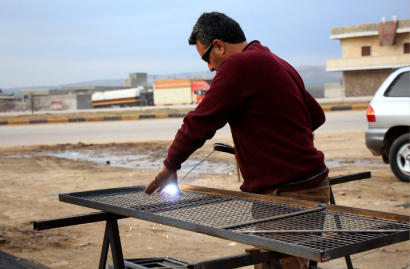
SECTOR INTRODUCTION
The Economic Empowerment Sector seeks to provide direct support to people to increase income and living standards.
It is a multidimensional social process that helps people control their own lives.
It is a practice in which power is adopted in societies for the mutual benefit of everyone.
It empowers and supports people to reach their goals by providing training, processes and opportunities.
SECTOR MISSION
To economically empower individuals and groups through capacity-building programs in small business management, vocational training, ultimately incubations and linking individuals to employment opportunities.
Supporting individuals and groups in establishing, accelerating and growing their own business with the potential to enter the formal economy.
Contributing to the resilience of internally displaced persons (IDPs) and refugees and building coherence between IDPs and host communities.
AREAS OF EXPERTISE
Vocational Training: Helps individuals reach economic stability and adapt to society better.
Small business management training: A comprehensive customized practical course enabling participants to manage their business and operations.
Linking individuals to income opportunities: Create a platform that connects qualified individuals with employment opportunities to fit their skills by supplying a start-up kit customized for each profession.
SECTOR HISTORY
The economic empowerment sector’s first project took place in 2013, and since then WATAN has implemented economic empowerment projects which contain the following activities.
Vocational training:
has been provided by WATAN to 600 youth and adults who need to acquire marketable skills.
Internships/apprenticeships:
WATAN have supported 450 apprenticeships/internships to allow vocational training recipients to gain experience in technical, rewarding jobs, apply what they have learned, and access immediate income.
Small-grants:
WATAN have distributed grants to start businesses to 200 community members (training graduates). The Action provided start-up grants for community members who want to start their own business, and livelihood training graduates. The selection process takes into account a business plan/idea submitted by the applicant, and the selection of grant recipients has been done in a collaborative process that involves both WATAN & Partner teams.
Initiate VSLA/CSLA groups:
WATAN have successfully formed 50 Community Savings and Loan Associations/groups with 830 members from host communities: Community Savings and Loan Associations.
Support SMEs:
The overall aim of this intervention was to improve the local population’s access to the labor market by stabilizing and/or expanding local businesses in order to generate further jobs. In order to enhance social cohesion and reduce competition for resources, the projects targeted 200 businesses, supporting 30% IDPs and 70% host community enterprises, including 15 female business owners.
Supporting Cash For Work Activities:
Cash for Work interventions provides employment to unskilled and semi-skilled workers on labor-intensive projects such as the rehabilitation of irrigation systems, soil conservation, and road construction and maintenance, WATAN has supported 352 beneficiaries (270 males, 82 females) under these activities.
SECTOR PHILOSOPHY AND
DIFFERENTIATORS
The program aims to further enhance support in contributing towards the resilience of IDPs and refugees and building coherence between host and guest communities.
As well as, employment opportunities and supporting the economic stability of individuals by supporting their resilience.
The focus is also placed on enhancing psycho-social health and well-being along with cohesion with the community by moving to productivity and providing a good example of positive coping.
The economic empowerment program is:
- Designed to be integrated with the other programs.
- Innovative initiatives and quality impacts
- Has large geographical coverage both inside Syria and in Turkey.
- Knowledge of the context and culture of Syrian and regional needs
- Partners relations and wide networking
PROJECTS
Syrian Resilience Consortium funded by European Commission:
- Duration: March 2017 till Dec 2018
- Location: Idleb – Harim district.
- Number of beneficiaries: 1,350 beneficiaries.
“Resist, Restore and Revive: A Triple Approach to Tackle Food Insecurity in Syria in Opposition Areas” funded by EU.
- Duration: Dec 2017 till Dec 2021
- Location: Idleb & Aleppo.
- Number of beneficiaries: 1,030 beneficiaries.
Supporting the Economic Recovery funded by Expertise France:
- Duration: Dec 2018 till June 2019
- Location: Aleppo – Atareb.
- Number of beneficiaries: 100 beneficiaries.
Supporting Small & Medium Enterprises in Idleb funded by IOM.
- Duration: April 2018 till Oct 2018
- Location: Aleppo.
- Number of beneficiaries: 100 beneficiaries.
Supporting Women Empowerment with CFW funded by JPF:
- Duration: May 2021 till March 2022
- Location: Idleb – Mareet Tamisreen.
- Number of beneficiaries: 52 beneficiaries.




